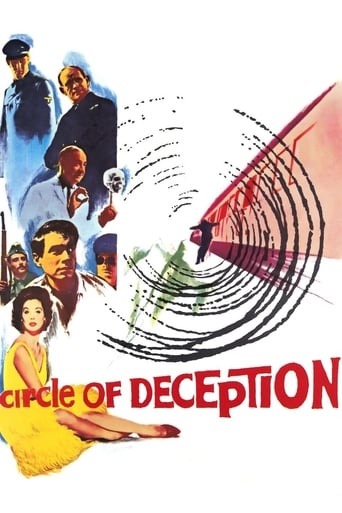JohnHowardReid
Copyright 30 December 1960 by 20th Century-Fox Film Corp. New York opening at the Victoria: 17 February 1961. U.S. release: 8 February 1961. U.K. release: 29 January 1961. Australian release: 23 February 1961. 8,971 feet. 99 minutes.COMMENT: For once, there was a pretty fair consensus among the critics as to the faults of this picture:"A first-class idea for a spy story is unnecessarily spoiled in this otherwise more-than-competent programmer... Screenwriter Balchin should have known better than to put a 'frame' around the story and tell the heart of it in flashback. The easily foreseen result of such ineptitude is that the spectator's pleasure is spoiled by knowing how it all ends", wrote Flavia Wharton in Films In Review.The reviewer for Variety also found "A weakness of the film is that it is revealed at the beginning that the hero gets through his ordeal safely." Time's critic tended to agree: "An ingenious spy thriller that raises subtle and uncomfortable questions of political morality. If a citizen betrays his country, the crime is called treason and the penalty, in wartime, is death. But what if a country betrays one of its citizens?" As for myself, I concur with most of the above. Suzy Parker is certainly dull all the way through. And some of the other acting is suspect. One of the faults of British films is that most players make no attempt whatever at conveying foreign nationals. Bosley Crowther noted that "Robert Stephens plays a Nazi captain as if he were a product of an English public school," but Mr. Stephens is merely part of — rather than an exception to — the tradition.Many of our problems center with the surrounding frame story which is not only poorly written but slackly directed too. Terseness and imagination from both quarters increase dramatically once the flashback starts. Here Balchin's suspenseful, to-the-point writing obviously incorporates his first-hand knowledge of the organizing and modus operandi of spying.The budget appears quite lavish by British "A"-feature standards and CinemaScope is well utilized.
tomsview
Years ago, I read "Op JB" by Christopher Creighton. It was published in 1996 and was supposedly true, telling of secret missions during WW2 carried out by the author. The veracity of the book is still debated.I must admit I wasn't sure what to believe until I came to the part where the author claimed he was used by M-Section to persuade the Germans that the Allied invasion of Europe would focus on the Pas de Calais rather than Normandy. His superiors betrayed his identity as a British agent to the SS so that under torture he would confirm the story, which he thought to be true. He was then rescued by M-section and returned to Britain.That's when I thought, "I know this story". It was the plot of "A Circle of Deception" starring Bradford Dillman, which I had seen in the 1960's. My belief in the book lessened considerably after I made that connection."A Circle of Deception" was a forerunner of the more cynical, anti-hero films about WW2 that hit with a vengeance in the 1960's. Then WW2 movies often became surrogates for the Vietnam War, which didn't get its own movies until it was over."Circle of Deception" didn't have massive stars. Bradford Dillman seemed a modern sort of actor mainly from television. His character, Captain Paul Raine, is chosen for the mission because it is believed he will crack under torture and give the Nazis the misinformation the British want them to have. Whatever baggage Dillman carried in 1960 is long gone; now he is convincing as the operative who wrestles to overcome his fears.Harry Andrews as Captain Rawson the intelligence chief who devised the mission is perfect. Head of Section roles were an Andrews' specialty.Suzy Parker played Lucy Bowen, Rawson's assistant who becomes romantically involved with Raine. Suzy had the look of those beautiful women that artists painted for the glossy magazine illustrations of the day; the camera loved her.The interrogation scenes gave the film an edge, especially Robert Stephens as the urbane German intelligence officer who played good cop against the vicious Gestapo guys. Only the prison escape at the end smacked of standard movie heroics.However, even after 50 years, this well-made film is still a bit of downer with its rather ruthless sacrifice of a British agent for the greater good.
RanchoTuVu
The British military brass led by Harry Andrews choose one of their own junior officers played by Bradford Dillman to go on a mission into Nazi-occupied France based on a psychological profile that he will crack under torture and reveal the false information they wish to have the Germans believe about the imminent D-Day invasion. Dillman is chosen for the mission on the recommendation of Suzy Parker, who plays Andrews administrative assistant. As a psychological drama Circle of Deception works fairly well. Parker is especially good at playing both ends, working to implement Andrews plan but also falling for Dillman. Dillman is good once he gets captured by the Germans, who torture him convincingly. After he breaks, Dillman's character has to live with himself, still believing that he let down the war effort by divulging true information.
edwagreen
Bradford Dillman in a dilly of a movie with the late Suzy Parker.The story concerns itself with British intelligence choosing someone they know will crack under Nazi torture and divulge secrets that will be false in nature pertaining to the D-Day invasion.Naturally, the female (Parker) falls for our hero.(Dillman) Of course, Dillman surprises all by surviving the brutal torture. The picture was torture by itself, watching the torturing sequences was even worse. The worst part was that the suicide pill wasn't supposed to work so Dillman had to endure more. Poor Dillman. Poor audience.This film at best is slow moving and tedious in many ways.


